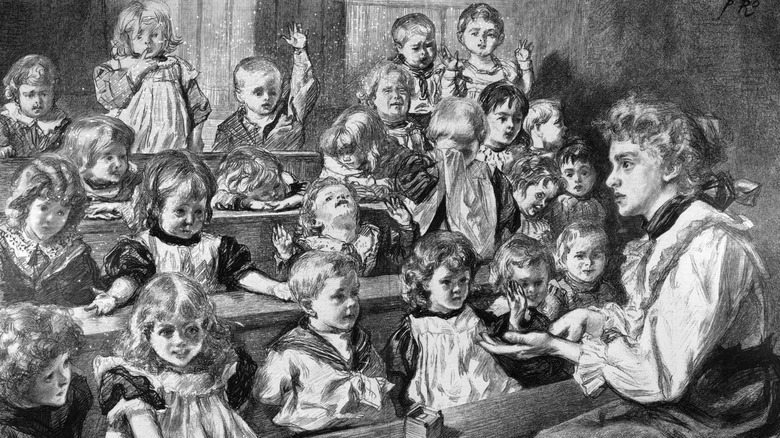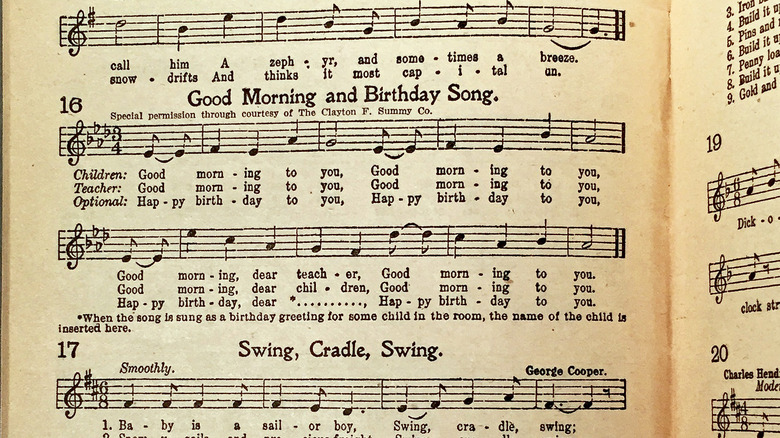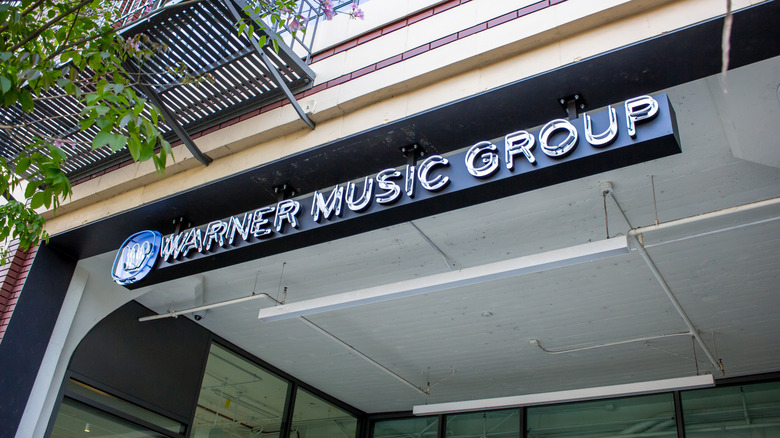Who Really Wrote The Happy Birthday Song?
It is perhaps the most familiar song in the English language, with (per the Birthday Celebrations website) dozens of versions sung around the world in many other languages. But "Happy Birthday To You," also known as "The Happy Birthday Song," has had a checkered history. While historians and musicologists agree that its origins are clear — it dates back to the late 19th century — what isn't known is how the song happened to take on the form by which it is best known today.
Similarly, ownership over the song has been contentious for the best part of four decades. This is, perhaps, not surprising. For an occasional song that is sung by millions of people every year, there is a huge financial impetus to lay claim to it; just think, for example, of the success of Mariah Carey's "All I Want For Christmas Is You," which some analysts have claimed nets the singer an eye-watering $1 million in yearly royalties (via The National News). By contrast, remember that "Happy Birthday" crops up each and every one of the other seasons of the year. And yes, there's lots and lots of money involved.
'Good Morning To All'
Though synonymous today with birthday celebrations, for the first few decades of its existence the song we know as "Happy Birthday To You" had no connection to birthdays at all. As USA Today notes, the song's origins can be traced back to two music-loving sisters in Louisville, Kentucky, named Patty and Mildred Hill. Mildred was an accomplished pianist, while Patty was a kindergarten teacher whose daily work involved teaching songs to young children. Patty became interested in developing the kind of songs that children would find stimulating, but would also be simple enough for them to learn. Patty enlisted Mildred to help create new compositions, which Patty would then test on her students.
"She was the musician and I was, if it is not using too pretentious a word, the poetess," recalled Patty in the 1930s. The sisters were attempting to create music that would be accessible to Patty's students, songs that Patty claimed "even the youngest children could learn with perfect ease" (via USA Today). What began as "Good Morning To All" appeared in the 1893 volume "Song Stories for the Kindergarten," written by Patty and Mildred, alongside other simple ditties with titles such as "Merry Little Snow-flakes," "The Rain on the Roof" and "Skipping Song." The Hill sisters' songs were seemingly a big hit with the children, especially "Good Morning To All," as the melody's enduring popularity suggests.
'Happy Birthday To You'
Surprisingly, there is no definitive historical record that tells us how Patty and Mildred Hill's 1893 composition "Good Morning To All" evolved into "Happy Birthday To You," but (per Mental Floss) some sources claim that the change occurred organically, most likely in Patty Hill's kindergarten classroom, as a natural consequence of the melody's simplicity and catchiness. We do, however, have a solid piece of evidence that indicates the period in which the change occurred. In 1912, the song appeared in a volume of arrangements published as promotional material by a company that made pianos, though without Patty and Mildred Hill's approval (per Reader's Digest). This version, though identical to the version published in 1893, contained the alternative birthday lyrics and remains the original source of the song as we know it today.
The song then appeared in further volumes, throughout the 1910s and 1920s, before being incorporated into two Broadway shows in the early 1930s. By this time, Mildred Hill had died, and the rights to their work had passed to their sister, Jessica. It was Jessica, along with Patty, who, aware that the song had been used without permission, pursued legal action. That culminated in the various versions of the work, including the new birthday arrangement, being published and purportedly copyrighted as the work of the Hill sisters by Chicago's Clayton F. Summy Company. That was the firm that had first published "Song Stories for the Kindergarten" back in 1890s, according to an article posted on the website of the U.S. Copyright Office.
Contested ownership
From the 1930s onwards, the Clayton F. Summy Company retained the copyright to "Happy Birthday To You." Per the U.S. Copyright Office, the company later became known as Summy-Birchard, which was bought by the music publishing giant Warner/Chappell in 1988. Following the purchase, Warner/Chappell continued to exert their ownership over the hugely popular song via their subsidiary. Tracing the copyright to the 1935 arrangement, the publisher argued that "Happy Birthday To You" was still under their control until 2030, at which point the song would finally pass into the public domain.
Being the copyright owners meant that Warner/Chappell was due royalties whenever the song featured in public performance, including its use in film and TV. According to USA Today, using "Happy Birthday to You" in such a way would cost a production in the region of $25,000-$30,000, while the Copyright Office article suggested in 2010 that Warner/Chappell was raking in around $2 million a year through licensing of the song.
Happy Birthday in court
For more than two decades, Warner/Chappell was earning big money from licensing what the Songwriters Hall of Fame suggests is possibly the most-sung song in the English language. But that all changed in 2016 as a result of a David-and-Goliath lawsuit between the company and an independent filmmaker which saw "Happy Birthday to You" finally make its way into the public domain.
Per CGTN America (via YouTube), filmmaker Jennifer Nelson was interested in making a documentary about "Happy Birthday to You," but in researching the song became convinced that Warner/Chappell's claim of ownership over the song was bogus. Nelson took the company to court, filing a class-action lawsuit on behalf of all those who had unfairly paid Warner/Chappell licensing fees. U.S. District Judge George H. King found against Warner/Chappell, stating that the copyright claim the company had exercised since 1988 was in fact invalid. "Defendants ask us to find that the Hill sisters eventually gave Summy Co. the rights in the lyrics to exploit and protect, but this assertion has no support in the record ... The Hill sisters gave Summy Co. the rights to the melody, and the rights to piano arrangements based on the melody, but never any rights to the lyrics" (via NBC News). Per The Hollywood Reporter, Warner/Chappell agreed to pay $14 million to settle the case, admitting that the song was indeed under no one's ownership.
An unexpected discovery
In August 2015, just months before Jennifer Nelson pushed Warner/Chappell to release "Happy Birthday to You" into the public domain, musicologists in Patty and Mildred Hill's hometown of Louisville, Kentucky announced that they had made a surprising discovery. According to the University of Louisville, library director James Procell was investigating the archives of the institution's Dwight Anderson Memorial Music Library when he chanced upon an original manuscript for "Good Morning to All," hidden within a sketchbook which once belonged to Mildred Hill. Hill's papers were donated to the library in the 1950s by her friend Hattie Bishop Speed, though her papers were not cataloged by the library at the time, meaning that no one was aware of the manuscript's existence for more than six decades.
The discovery coincided with a growing interest in the Hill sisters and their accomplishments as songwriters and educators. In 2014, Louisville residents announced they would be honoring their famous songwriting daughters with a memorial known as "Happy Birthday Park," with crowdfunding for the project still ongoing.





